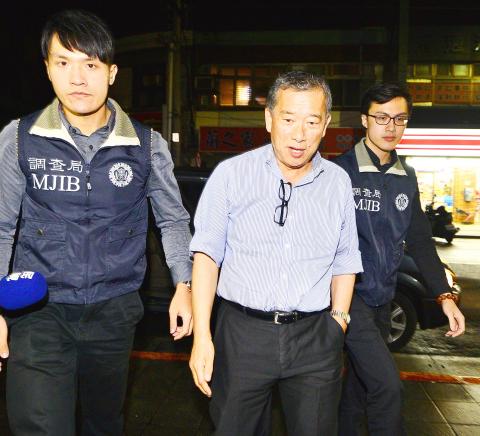OBI Pharma Inc (台灣浩鼎) chairman Michael Chang (張念慈) was yesterday morning released after posting NT$1 million (US$30,914) bail, as prosecutors listed him as a defendant on insider trading charges.
Chang and four other OBI Pharma executives were summoned for questioning at the Shilin District Prosecutors’ Office in Taipei on Friday, after judicial investigators searched the company headquarters and its laboratories to gather evidence earlier that day.
Prosecutors said they had made breakthroughs in the investigation and therefore questioned the other four company executives, including OBI Pharma general manager Huang Hsiu-mei (黃秀美), head of research and development Yu Cheng-te (游丞德), administration division manager Liao Tsung-chih (廖宗智) and finance division manager Chang Sui-fen (張穗芬), to gather information related to the case.

Photo: Wang Yi-sung, Taipei Times
Prosecutors said there is sufficient evidence of their involvement in insider trading to list them as defendants in the case, but they were released without bail yesterday.
OBI Pharma yesterday issued a statement, saying the company did not engage in any illegal activities, and asked the justice agencies to conduct a fair and unbiased investigation to clear the company of the charges.
The statement criticized the search process, with judicial investigators confiscating private documents and material containing proprietary business information, some of which relates to the company’s core technology development, including results of more than 10 years of research, which it said would adversely affect the rights of company shareholders if leaked and deal a severe blow to the nation’s pharmaceutical, healthcare and bioscience industries.
Academia Sinica President Wong Chi-huey (翁啟惠), a prominent Taiwanese-American biochemist and research scientist, has also been embroiled in the affair.
He returned to Taiwan from the US on Friday and met with President Ma Ying-jeou (馬英九) to discuss the case; he again apologized to the public for the controversy, saying he was not involved in insider trading and had no intention of manipulating OBI Pharma shares, some of which were held in his daughter’s name.
While he was in the US, Wong tendered his resignation on March 31, but Ma rejected it.
In related news, Academia Sinica yesterday settled on three candidates for its next president, with the list to be forwarded to the Presidential Office for selection, Academia Sinica Vice President Wang Fan-sen (王汎森) said.
Additional reporting by Wu Po-wei

Conflict with Taiwan could leave China with “massive economic disruption, catastrophic military losses, significant social unrest, and devastating sanctions,” a US think tank said in a report released on Monday. The German Marshall Fund released a report titled If China Attacks Taiwan: The Consequences for China of “Minor Conflict” and “Major War” Scenarios. The report details the “massive” economic, military, social and international costs to China in the event of a minor conflict or major war with Taiwan, estimating that the Chinese People’s Liberation Army (PLA) could sustain losses of more than half of its active-duty ground forces, including 100,000 troops. Understanding Chinese

The Ministry of Foreign Affairs (MOFA) yesterday said it is closely monitoring developments in Venezuela, and would continue to cooperate with democratic allies and work together for regional and global security, stability, and prosperity. The remarks came after the US on Saturday launched a series of airstrikes in Venezuela and kidnapped Venezuelan President Nicolas Maduro, who was later flown to New York along with his wife. The pair face US charges related to drug trafficking and alleged cooperation with gangs designated as terrorist organizations. Maduro has denied the allegations. The ministry said that it is closely monitoring the political and economic situation

UNRELENTING: China attempted cyberattacks on Taiwan’s critical infrastructure 2.63 million times per day last year, up from 1.23 million in 2023, the NSB said China’s cyberarmy has long engaged in cyberattacks against Taiwan’s critical infrastructure, employing diverse and evolving tactics, the National Security Bureau (NSB) said yesterday, adding that cyberattacks on critical energy infrastructure last year increased 10-fold compared with the previous year. The NSB yesterday released a report titled Analysis on China’s Cyber Threats to Taiwan’s Critical Infrastructure in 2025, outlining the number of cyberattacks, major tactics and hacker groups. Taiwan’s national intelligence community identified a large number of cybersecurity incidents last year, the bureau said in a statement. China’s cyberarmy last year launched an average of 2.63 million intrusion attempts per day targeting Taiwan’s critical

AGING: As of last month, people aged 65 or older accounted for 20.06 percent of the total population and the number of couples who got married fell by 18,685 from 2024 Taiwan has surpassed South Korea as the country least willing to have children, with an annual crude birthrate of 4.62 per 1,000 people, Ministry of the Interior data showed yesterday. The nation was previously ranked the second-lowest country in terms of total fertility rate, or the average number of children a woman has in her lifetime. However, South Korea’s fertility rate began to recover from 2023, with total fertility rate rising from 0.72 and estimated to reach 0.82 to 0.85 by last year, and the crude birthrate projected at 6.7 per 1,000 people. Japan’s crude birthrate was projected to fall below six,